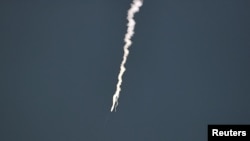With latest missile test, North Korea aims to overwhelm US defenses
Seoul, South Korea —
North Korea claimed progress Thursday on testing a missile meant to contain multiple warheads, an advanced weapon aimed at penetrating U.S. missile defenses.

According to the state-run Korean Central News Agency, North Korea “successfully conducted the separation and guidance control test of individual mobile warheads” during a Wednesday launch.
KCNA said the first stage engine of an intermediate-range solid-fuel ballistic missile carried the warheads, which “were guided correctly to the three coordinate targets.”
The test, which also included decoy warheads, was aimed at securing the capability for multiple independently targetable reentry vehicles, or MIRVs, KCNA added.
If confirmed, analysts say the development would mark significant progress toward North Korean leader Kim Jong Un's goal of developing a long-range missile with multiple warheads that could overwhelm U.S. missile defenses, which have limited interceptors.
An ‘exaggeration,’ says South
South Korea’s military initially reported the launch as a failure, noting it ended in a mid-air explosion during the early stages of its flight.
On Thursday, a spokesperson for South Korea’s Joint Chiefs of Staff stuck by that assessment, dismissing the North Korean claim as a “deception and exaggeration.”
Whereas the warheads on such a missile typically separate in the descent stage, the JCS spokesperson said the North Korean missile exploded mid-air during an early stage of flight.
“A number of videos and photos taken by the private sector yesterday show that the missile's flight was not normal,” he said.
South Korean broadcasters on Wednesday aired multiple videos showing an object that appeared to spin out of control before exploding and plunging toward earth. The videos were taken by residents in South Korea's far northwestern islands.
Decker Eveleth, who studies North Korea’s strategic forces for the Center for Naval Analyses, said it is hard to determine the success of the launch with certainty, given the available public evidence.
“The stage was spinning at the end. Sometimes that's an intentional maneuver and sometimes it's not,” Eveleth told VOA.
Missile defense woes
North Korea has previously conducted tests of various MIRV components, including systems meant to aim multiple warheads. But the latest launch appears to have gone further, using multiple warheads as well as decoys, which aim to confuse missile defense shields.
The United States is currently protected, in theory, by a missile defense shield with 44 interceptors designed for ICBM missiles. That figure is set to expand to 64. Those numbers allow little room for error, even before factoring in missiles with multiple warheads, according to analysts.
With MIRVs, North Korea has a “much, much higher chance of overwhelming American missile defense,” Eveleth said.
“Many nuclear experts spent about a decade arguing that missile defense was not cost effective and the DPRK would simply outbuild the shield when they got a program rolling. These concerns were dismissed, largely because people did not think the DPRK was capable of a program of that scale. And here we are,” Eveleth told VOA.
By placing multiple warheads on a single missile, North Korea can also reduce the need for mobile missile launchers, or TELs, which it has had difficulty producing.
What’s next
North Korea’s launch represents the latest effort to work through a wish-list of strategic weapons laid out by Kim in 2021. The list also included hypersonic missiles, spy satellites, solid-fuel ICBMs, and submarine-launched missiles — all areas where North Korea has since made advances.
Kim says his nuclear weapons program is necessary to deter attacks from the United States, which has tens of thousands of troops in the region. He has also warned he could preemptively use nuclear weapons to counter what he says are hostile forces in the region.
Analysts are especially looking for any signs of Russian help with North Korean weapons. Earlier this month, Russia and North Korea signed a mutual defense treaty. After the signing, Russian President Vladimir Putin suggested the arrangement could help facilitate arms transfers.
On Thursday, a South Korean military spokesperson said it was difficult to determine whether the latest launch included any help from Russia.
Given that North Korea claimed only “fairly modest and technical” successes with its latest MIRV launch, more tests using such technology are likely, said Ankit Panda, a senior fellow at Washington's Carnegie Endowment for International Peace.
“If their claims are true, I'd expect to see further iteration,” Panda said. “Even if this wasn't a total success, I suspect the Missile Administration received useful data that'll contribute to advancing their missile capabilities, including a MIRV capability.”
Lee Juhyun contributed to this report.









































